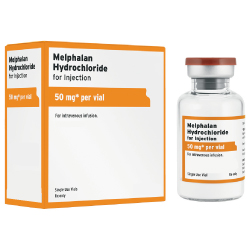Description
The drug Melphalan is used in treating patients with multiple myeloma. Melphalan is an alkylating agent of the bis chloroethyl amine type.
Dosage:
This drug comes in 50 mg in single-dose vials for intravenous infusion. The recommended dosage of Melphalan is 100 mg/m2 /day administered over 30 minutes by intravenous infusion for 2 consecutive days in conditioning treatment of multiple myeloma, and the recommended dosage in palliative treatment is 16 mg/m2 administered as a single intravenous infusion over 15-20 minutes at 2-week intervals for 4 doses.
Side-effects:
The common side-effects of Melphalan are:
- Neutrophil count decreased
- White blood cell count decreased
- Lymphocyte count decreased
- Platelet count decreased
- Diarrhea
- Nausea
- Fatigue
- Hypokalemia
- Anemia
- Vomiting
- For patients receiving Melphalan as part of a conditioning regimen, myeloablation occurs in all patients. One should not begin the conditioning regimen if a stem cell product is not available for rescue. Healthcare professionals should monitor complete blood counts and provide supportive care for infections, anemia, and thrombocytopenia until there is adequate hematopoietic recovery.
- The patients who receive Melphalan as palliative treatment, if the bone marrow has been compromised by prior irradiation or prior chemotherapy or is recovering from chemotherapy, the risk of severe myelosuppression with Melphalan is increased. One should perform periodic complete blood counts during the course of treatment with Melphalan.
- The patients receiving Melphalan as part of a conditioning regimen should use prophylactic antiemetic medication, and one should provide supportive care for nausea, vomiting, diarrhea, and mucositis. And for the patients receiving Melphalan as palliative treatment, nausea and vomiting, diarrhea, and oral ulceration may occur. One should use prophylactic antiemetics. And one should provide supportive care for nausea, vomiting, diarrhea, and mucositis.
- Reports about hepatic disorders range from abnormal liver function tests to clinical manifestations such as hepatitis and jaundice after treatment with Melphalan.
- Based on its mechanism of action, Melphalan can cause fetal harm when administered to a pregnant woman. Healthcare professionals advise females of reproductive potential to avoid pregnancy during and after treatment with Melphalan.

